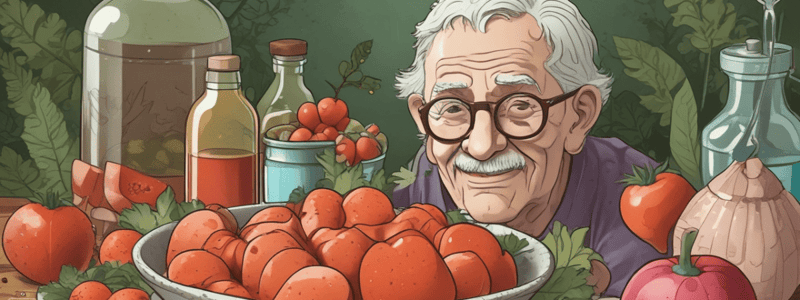Podcast
Questions and Answers
What are two ways adults can meet their vitamin B12 needs?
What are two ways adults can meet their vitamin B12 needs?
supplements and foods fortified with crystalline, free vitamin B12
What are three factors that can increase the risk of iron deficiency in older people?
What are three factors that can increase the risk of iron deficiency in older people?
chronic blood loss from ulcers, poor iron absorption, and medicine like aspirin
What are three nutrition-disease relationships in old age?
What are three nutrition-disease relationships in old age?
coronary heart disease, non-insulin dependent diabetes, and cataract
What are three examples of supplements commonly recommended for elderly people?
What are three examples of supplements commonly recommended for elderly people?
What are four examples of nutrient-dense foods?
What are four examples of nutrient-dense foods?
What are two functions of lactoferrin in mother's milk?
What are two functions of lactoferrin in mother's milk?
What are three anti-infective components present in breast milk?
What are three anti-infective components present in breast milk?
What are three causes of malnutrition in hospital patients?
What are three causes of malnutrition in hospital patients?
What are three indications for enteral tube feeding?
What are three indications for enteral tube feeding?
What are three complications of enteral feeding?
What are three complications of enteral feeding?
What are the complications of parenteral nutrition?
What are the complications of parenteral nutrition?
How can the body deal with an excess of dietary calories?
How can the body deal with an excess of dietary calories?
What is the role of fat in the body?
What is the role of fat in the body?
What are the cons of the DASH diet?
What are the cons of the DASH diet?
What are the benefits of a low-protein diet in CKD?
What are the benefits of a low-protein diet in CKD?
What are the results of increased sodium in patients with CKD?
What are the results of increased sodium in patients with CKD?
How is anorexia managed?
How is anorexia managed?
What are the causes of gastroesophageal reflux disorder?
What are the causes of gastroesophageal reflux disorder?
What are the benefits of daily exercise for diabetes patients?
What are the benefits of daily exercise for diabetes patients?
What are the worst diet choices for diabetes patients?
What are the worst diet choices for diabetes patients?
Flashcards are hidden until you start studying
Study Notes
Vitamin B12 and Iron Deficiency
- Adults can meet their vitamin B12 needs through supplements or foods fortified with crystalline, free vitamin B12
- Factors that can increase the risk of iron deficiency in older people include chronic blood loss from ulcers, poor iron absorption, and certain medications like aspirin
Nutrition-Disease Relationships in Old Age
- Coronary heart disease, non-insulin dependent diabetes, and cataract are nutrition-disease relationships in old age
- Vitamin B12 supplements, calcium, and general multivitamins are recommended for the elderly
- Examples of nutrient-dense foods include fruits like strawberries and blueberries, whole grains like corn and wheat, green leafy vegetables like broccoli and spinach, and oily fish rich in omega-3 like salmon and sardines
Lactoferrin and Breast Milk
- Lactoferrin in mother's milk helps regulate iron absorption and restricts bacterial growth
- Breast milk provides a complex range of anti-infective components, including macrophages, lymphocytes, and immunoglobulins
Malnutrition and Enteral Tube Feeding
- Causes of malnutrition in hospital patients include anorexia, inability to eat, and intestinal disease
- Indications for enteral tube feeding include anorexia, swallowing disorders, and gastric stasis
- Complications of enteral feeding include metabolic complications, gastrointestinal symptoms, and nutrient delivery complications
Parenteral Nutrition
- Indications for parenteral nutrition are short-term (severe inflammatory bowel disease, patients with multi-organ failure, major surgery) and long-term (inflammatory disease, motility disorders, mesenteric infarction)
- Complications of parenteral nutrition include nutritional and metabolic complications, catheter-related complications, and infection
Dealing with Excess Dietary Calories
- The body can deal with excess dietary calories by converting excess fuel to fat and storing it in adipose tissue, burning excess fuel through extra exercise, or wasting fuel by diverting it into heat production
Laboratory Tests for Nutritional Status
- Laboratory tests to assess nutritional status include serum proteins, CBC, iron and vitamin levels, lipid profile, and hormone levels (e.g. TSH)
Pharmacological Treatment for Obesity
- Pharmacological treatment for obesity includes appetite suppressants and pancreatic lipase inhibitors
Importance of Fat
- Fat plays a key role in hormone production (e.g. estrogen, progesterone, testosterone), cell health, and nutrient absorption
DASH Diet and Kidney Disease
- Cons of the DASH diet (eating too little salt) include increased insulin resistance and increased risk of death in people with heart failure
- Ways to manage kidney disease include controlling blood pressure, blood glucose levels, and taking prescribed medications
- Risk factors for kidney disease include modifiable factors (diabetes, hypertension, frequent NSAID use) and non-modifiable factors (family history, age 60 or older)
Benefits of Low-Protein Diet in CKD
- Benefits of a low-protein diet in CKD include reduced uremic symptoms, reduced burden of uremic toxins, and slowed progression of renal failure
Sodium and Kidney Disease
- Increasing sodium in patients with CKD can lead to high blood pressure, excessive thirst, swelling, and congestive heart failure
Managing Patients with Anorexia and Gastroesophageal Reflex Disorder
- Ways to manage patients with anorexia include serving food attractively, providing small, frequent meals, and limiting fat intake
- Causes of gastroesophageal reflux disorder include abnormal relaxation of the lower esophageal sphincter and increased intra-abdominal pressure
- Ways to manage patients with gastroesophageal reflux disorder include not overeating, avoiding high-fat and spicy foods, and avoiding lying down after meals
Dumping Syndrome and the Three D's
- Ways to manage patients with dumping syndrome include eating fibers, lying down after eating, and drinking liquids between meals
- The three D's are diet, drugs, and daily activity
Studying That Suits You
Use AI to generate personalized quizzes and flashcards to suit your learning preferences.




